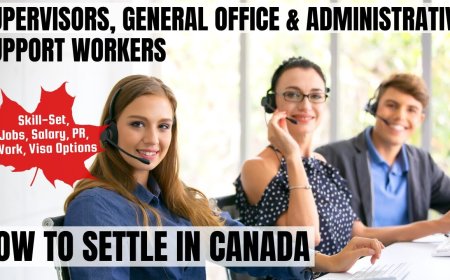Other financial officers Guide to Canada Immigration: Exploring Salaries, Job Duties, and Where to Live
Welcome to the pathway to Canada immigration for skilled professionals and trade workers. This guide is specifically tailored for Other financial officers looking to work and settle in Canada, offering a deep dive into the essential aspects of immigration and employment in this field.
Introduction
Canada is known for its strong economy and diverse job opportunities, making it an attractive destination for professionals looking to advance their careers. In this article, we will be focusing on the career and immigration prospects for Other financial officers in Canada. This role, categorized under the National Occupation Classification code NOC 1114, plays a key role in various financial institutions and organizations. We will cover the profile description, main job duties, education and license requirements, necessary skills, median salaries and retirement prospects, as well as possible visa options for foreign professionals looking to pursue a career in this field in Canada.
What is the Profile Description of a Other financial officers as per the Canadian National Occupation Classification (NOC) Standards?
Other financial officers encompass a range of professional roles within the finance industry, including financial planners, examiners, investigators, underwriters, mortgage brokers, and trust officers. They typically work for banks, trust companies, investment firms, or government agencies, although some may also work as independent professionals. These individuals are responsible for managing various financial functions and ensuring compliance with regulations to protect the financial well-being of their clients or organizations.
What are the Main Job Duties of a Other financial officers in Canada?
- Develop comprehensive personal financial plans for clients, covering cash management, finances, insurance coverage, investments, retirement and estate planning, taxes, and legal matters.
- Analyze clients' financial records, set goals, and develop a customized financial strategy tailored to their needs and objectives.
- Advise clients on the implementation of the financial plan to help them achieve their financial goals and objectives effectively.
- Review and examine financial institutions to ensure compliance with governing legislation and regulations, such as banks, credit unions, insurance companies, and securities brokers.
- Negotiate mortgage loans on behalf of clients with lenders or lending institutions, and provide guidance on the type and terms of new securities issued.
What are the Education, Certifications, and Licensing Requirements to Work as Other financial officers in Canada?
To qualify for a position as an Other financial officer, candidates typically need to have a bachelor's degree in business administration, commerce, economics, or a related field. Additionally, they may need to complete various training programs and courses offered by financial institutes and organizations like the Canadian Securities Institute, Institute of Canadian Bankers, and Institute of Chartered Financial Analysts. Employers may also require the Certified Financial Planner designation from the Financial Planners Standards Council of Canada. In Quebec, certification as a Financial Planner is mandatory. Those who sell regulated financial products must be licensed by the appropriate governing body, and financial examiners and inspectors may need a recognized accounting designation. Mortgage brokers have additional licensing requirements, such as a real estate licence in Quebec and a mortgage broker licence in several provinces.
What Essential Skills are Required for Other financial officers to succeed in Canada?
To be successful in the profession of other financial officers, individuals must possess a diverse set of essential skills. These include the ability to identify clients' financial goals and objectives, analyze their financial records, and develop comprehensive financial plans. Other crucial skills include making recommendations on cash management, insurance coverage, investment planning, retirement, and estate planning. Financial officers also need to arrange for the sale of financial products and investments, review financial services and institutions for compliance with regulations, investigate unethical conduct, underwrite new issues of stocks and bonds, negotiate terms for new securities, prepare offering prospectuses, negotiate mortgage loans, and administer various types of trusts. Overall, a successful financial officer must have a strong understanding of financial markets, regulations, and investment opportunities, as well as the ability to communicate effectively with clients and navigate complex financial transactions.
What is the Median Age and Retirement Age for Other financial officers in Canada?
The skilled professionals working as Other financial officers have a median age of 43, indicating that the workforce is relatively young and likely to have a good amount of experience in the field. The average retirement age of 63 suggests that these professionals tend to have long and successful careers in the financial industry before transitioning into retirement. This data reflects a trend of professionals in this field working for several decades before retiring, highlighting the dedication and expertise required for success in the financial sector.
How Many Job Openings are available for Other financial officers in Canada, and what is the Job scope for Other financial officers across different Provinces?
There are a total of 177 job openings for the profile of Other financial officers in Canada. The province with the highest number of job openings is Quebec with 140 positions available, followed by Saskatchewan with 14 job openings. British Columbia and Ontario have 9 and 8 job openings respectively. Alberta, New Brunswick, and Newfoundland and Labrador have the least number of job openings with only 2, 2, and 1 positions available respectively. Quebec has the maximum number of job openings while Newfoundland and Labrador has the minimum number of job openings for Other financial officers in Canada.
What is the hourly wage or salary of Other financial officers in different Provinces of Canada?
According to the wage analysis for Other financial officers in Canada, Newfoundland and Labrador offers the highest wages for this profession with a high wage of $75.00, a median wage of $29.23, and a low wage of $23.08. Alberta follows closely behind with a high wage of $61.78, a median wage of $40.87, and a low wage of $23.08. On the other hand, Quebec offers the lowest wages with a high wage of $50.73, a median wage of $29.00, and a low wage of $20.00. In general, wages for Other financial officers in Canada tend to be higher in the western provinces such as Alberta and British Columbia compared to the eastern provinces like Quebec and New Brunswick.
What are the various visa options available for Other financial officers migrating to Canada?
Other financial officers looking to migrate to Canada have various visa options available to them. They can apply for the Express Entry Visa Category, which is a point-based system that takes into account factors such as age, education, work experience, and language proficiency. Another option is the Provincial Nominee Program, where provinces and territories can nominate individuals based on their skills and experience. Additionally, there are also Employer Sponsored Work Visas available for those who have a job offer from a Canadian employer. Other financial officers can directly apply under these programs to secure a visa to Canada. Apart from these options, there may be other visa categories currently open for this profile. To know more about the visa options and discuss your eligibility in detail, you can book an appointment with our professionals today.
Have Questions or Need Assistance?
If you have any queries or require assistance with your immigration plans, we're here to help. Our experienced immigration consultants are ready to provide personalized guidance tailored to your specific needs.
Don't hesitate to reach out and schedule an appointment today. Whether you're seeking clarification on immigration processes, exploring visa options, or need support with documentation, we're dedicated to assisting you every step of the way.
Book an appointment with our team to discuss your immigration goals and receive expert guidance for your journey to Canada.
What's Your Reaction?
 Like
0
Like
0
 Dislike
0
Dislike
0
 Love
0
Love
0
 Funny
0
Funny
0
 Angry
0
Angry
0
 Sad
0
Sad
0
 Wow
0
Wow
0









































































